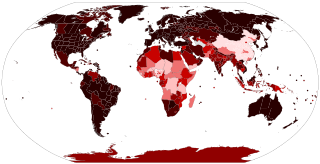
This article provides a general overview and documents the status of locations by continents and conveyance of the world affected by the coronavirus responsible for the ongoing 2019–20 pandemic originating in Wuhan, Hubei, China. It may not include all the most up-to-date major responses and measures by individual countries and territories.

The 2020 coronavirus pandemic in Canada is part of the ongoing worldwide pandemic of coronavirus disease 2019 caused by severe acute respiratory syndrome coronavirus 2. The disease was confirmed to have reached Canada on January 27, 2020, after a man who had returned to Toronto from Wuhan, Hubei, China, tested positive. As of May 1, 2020, there have been over 55,000 confirmed cases, 22,751 recoveries and 3,391 deaths in the country. The Government of Canada has released modelling anticipating 11,000–22,000 deaths over the course of the pandemic, assuming "stronger epidemic control".

The 2019–20 coronavirus pandemic was confirmed to have reached North America in January 2020. As of 25 March 2020, all North American countries have reported at least one case of COVID-19.
The 2019–20 coronavirus pandemic was confirmed to have reached Lebanon in February 2020.

The 2019–20 coronavirus pandemic was confirmed to have spread to Africa on 14 February 2020. The first confirmed case was in Egypt, and the first confirmed case in sub-Saharan Africa was in Nigeria. Most of the identified imported cases have arrived from Europe and the United States rather than from China.

The 2019–20 coronavirus pandemic was confirmed to have reached Oceania in January 2020. The first confirmed case was reported in Australia. As of 25 April, ten Oceania sovereign states have yet to report a case of COVID-19: Kiribati, Marshall Islands, Federated State of Micronesia, Nauru, Palau, Samoa, Solomon Islands, Tonga, Tuvalu and Vanuatu.

The ongoing 2019–20 coronavirus pandemic spread to South Africa with Minister of Health Zweli Mkhize announcing the first confirmed case on 5 March 2020, the patient being a South African returning from Italy.
The 2020 coronavirus pandemic in the Bailiwick of Jersey is part of an ongoing global pandemic of coronavirus disease 2019 (COVID-19), a novel infectious disease caused by severe acute respiratory syndrome coronavirus 2 (SARS-CoV-2). The first case in Jersey was confirmed on 10 March 2020 when a person tested positive on the island after returning from Italy.
The 2019–20 coronavirus pandemic was confirmed to have spread to the Maldives on 7 March 2020 from an Italian tourist who had returned to Italy after spending holidays in Kuredu Resort & Spa. The Health Protection Agency of the Maldives confirmed two cases in the Maldives, both employees of the resort. Following this, the hotel was locked down with several tourists stranded on the island. As of 11 March, the islands resorts of Kuredu, Vilamendhoo, Batalaa and Kuramathi island have also been placed under temporary quarantine. Schools have been closed as a precaution.

The 2019–20 coronavirus pandemic was confirmed to have reached South America, first reported on 26 February when Brazil confirmed a case in São Paulo. By 3 April, all countries and territories in South America, including the French overseas department of French Guiana, and the British Overseas Territory of the Falkland Islands, have recorded at least one case.
The 2019–20 coronavirus pandemic was confirmed to have reached Seychelles in March 2020. No cases have been reported in Praslin, La Digue, Silhouette Island and Outer Islands.
The 2019–20 coronavirus pandemic was confirmed to have reached the United States territory of the Northern Mariana Islands in March 2020.
The 2020 coronavirus pandemic in Grenada is part of the ongoing global viral pandemic of coronavirus disease 2019 (COVID-19), which was confirmed to have reached Grenada on March 22, 2020. Despite lockdowns and social distancing protocols, it appeared to have reached the level of community spread within one month.

The 2020 coronavirus pandemic in Montserrat is part of the ongoing global viral pandemic of coronavirus disease 2019 (COVID-19), which was confirmed to have reached the British Overseas Territory of Montserrat on 17 March 2020.. The first death occurred on 24 April 2020.
The 2019–20 coronavirus pandemic was confirmed to have reached the British crown dependency of the Isle of Man on 19 March 2020.
The ongoing coronavirus pandemic reached Northern Ireland on 29 February 2020. Northern Ireland has the lowest recorded coronavirus death rate in the United Kingdom and a lower rate than the Republic of Ireland. It is also carrying out more tests per capita than the other countries of the United Kingdom. According to the Department of Health, 365 people have died after testing positive for coronavirus, both in hospitals and care homes.

Countries and territories in South Asia have been affected by the 2019–20 coronavirus pandemic.

The 2020 coronavirus pandemic in Sint Eustatius is part of the ongoing global viral pandemic of coronavirus disease 2019 (COVID-19), which was confirmed to have reached the Dutch Caribbean of Sint Eustatius on March 31, 2020. The island has a population of 3,139 people.

The 2020 coronavirus pandemic in Saba is part of the ongoing global viral pandemic of coronavirus disease 2019 (COVID-19), which was confirmed to have reached the Dutch Caribbean island of Saba on April 12, 2020. The island has a population of 1,905 people.

The 2020 coronavirus pandemic in Bonaire is part of the ongoing global viral pandemic of coronavirus disease 2019 (COVID-19), which was confirmed to have reached the Dutch Caribbean island of Bonaire on 16 April 2020. On 28 April, all cases recovered.











